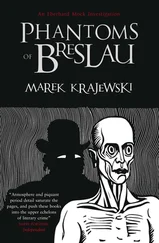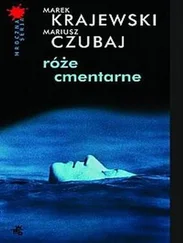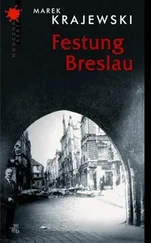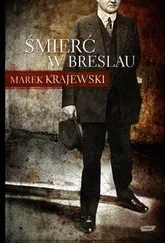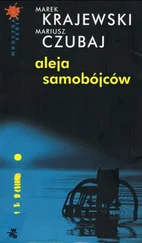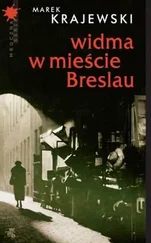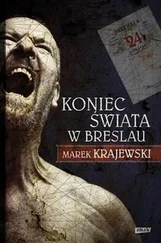Marek Krajewski - Death in Breslau
Здесь есть возможность читать онлайн «Marek Krajewski - Death in Breslau» весь текст электронной книги совершенно бесплатно (целиком полную версию без сокращений). В некоторых случаях можно слушать аудио, скачать через торрент в формате fb2 и присутствует краткое содержание. Жанр: Полицейский детектив, на английском языке. Описание произведения, (предисловие) а так же отзывы посетителей доступны на портале библиотеки ЛибКат.
- Название:Death in Breslau
- Автор:
- Жанр:
- Год:неизвестен
- ISBN:нет данных
- Рейтинг книги:3 / 5. Голосов: 1
-
Избранное:Добавить в избранное
- Отзывы:
-
Ваша оценка:
- 60
- 1
- 2
- 3
- 4
- 5
Death in Breslau: краткое содержание, описание и аннотация
Предлагаем к чтению аннотацию, описание, краткое содержание или предисловие (зависит от того, что написал сам автор книги «Death in Breslau»). Если вы не нашли необходимую информацию о книге — напишите в комментариях, мы постараемся отыскать её.
Death in Breslau — читать онлайн бесплатно полную книгу (весь текст) целиком
Ниже представлен текст книги, разбитый по страницам. Система сохранения места последней прочитанной страницы, позволяет с удобством читать онлайн бесплатно книгу «Death in Breslau», без необходимости каждый раз заново искать на чём Вы остановились. Поставьте закладку, и сможете в любой момент перейти на страницу, на которой закончили чтение.
Интервал:
Закладка:
“Wake up, Anwaldt,” he touched the sleeping man’s shoulder. “Your lunch will get cold.”
Smoking a cigar, he watched as Anwaldt greedily consumed a beefsteak with sauerkraut and potatoes.
“Please don’t be offended, Herbert,” Mock placed a hand on his bloated stomach. “I’ve eaten too much, but you, I see, have an excellent appetite. Perhaps you’d like this piece of salmon? I haven’t touched it.”
“With pleasure. Thank you,” smiled Anwaldt. Nobody had ever shared their food with him. He ate the fish with relish and took a fair draught of strong, black tea.
Mock built Anwaldt’s character profile in his thoughts. It was not complete without the details of his torture in the Gestapo cell, but no tactical question, no trick which could provoke Anwaldt into confessing, came to mind. Several times, he opened his mouth and immediately closed it again because it seemed that what he was about to say sounded silly and flat. After a while, he came to terms with the thought that he would not be reading Anwaldt’s psychological profile to Madame le Goef’s girls next week.
“It’s half-past one now. Before half-past four, please look through von Kopperlingk’s files and consider how we can pin him down. Please look through the files of all the Turks, too. Maybe you’ll find something. At half-past four, you’re to give all those files to Forstner; at five, collect the photographs from Ehlers and come to see me in my apartment. I’m leaving the car with you. Everything clear?”
“Yes, sir.”
“So why are you looking at me so strangely? Do you need anything?”
“Nothing, nothing … It’s just that nobody’s ever shared their food with me.”
Mock laughed out loud and patted Anwaldt on the shoulder with his small hand.
“Don’t take it as a sign of my particularly liking you,” he lied. “It’s a habit from childhood. I always had to hand in an empty plate … I’m taking a droschka home now. I need a nap. Goodbye.”
The Criminal Director was falling asleep already in the cab. On the threshold of sleep and wakefulness, he remembered a Sunday lunch a year ago. He was sitting with his wife in the dining-room, happily nibbling spare ribs in tomato sauce. His wife was also eating with great relish, going through all the meat first. At one point, she glanced pleadingly at the plate in front of Mock, who always left the best pieces to the end.
“Please, do give me a little of your meat.”
Mock did not react and stuffed all the meat still remaining on his plate into his mouth.
“I’m certain you would not even give it to your children — if you could have any, of course.” She got up, angry. (She was wrong again. I did give some to one. And to one not my own.)
BRESLAU, THAT SAME JULY 14TH, 1934
TWO O’CLOCK IN THE AFTERNOON
Anwaldt left the restaurant and climbed into the car. He glanced at the files stamped by the Gestapo, and at the package which he had collected that morning from the archives. Unwrapping it, he shuddered: strange, curved writing. Blackened blood on blue wallpaper. He rewrapped the bloody writing and got out of the car. Under his arm, he carried the Gestapo files and the blanket used by Mock to cover the back seat. He did not feel like driving through the scorching city. He made off in the direction of the slender steeples of St Michael’s Church to Waschteich Park, whose strange name Mock had explained to him during their drive: in the Middle Ages, women used to wash their linen in the pond there. Now children were shouting and running by the pond while most of the benches were occupied by nursemaids and servants. These women demonstrated an excellent capacity to divide their attention as they pursued vociferous discussions while, from time to time, shouting at the children wading in the shallow waters by the bank. The remaining benches were occupied by soldiers and local scamps proudly smoking cigarettes.
Anwaldt removed his jacket, lay on the blanket and began to examine von Kopperlingk’s files. Unfortunately, there was nothing in them that he could use to pin down the Baron. What was more: everything the Baron did in his apartment and on his property took place with the Gestapo’s full blessing. (Mock told me that even Kraus, although he was furious when he heard about his homosexual agent, soon realized the advantage to be gained from him.) The last piece of information filled Anwaldt with hope: it concerned the Baron’s servant, Hans Tetges.
He turned on his back and, with the help of a few brutal and suggestive images, thought of a way for the Baron. Pleased with his idea, he now started looking through the files written by the Gestapo and the C.I.D. concerning Turks. There were eight Turks in all: five had left Breslau before July 9th, when the Baron’s ball had taken place, the other three had to be excluded because of their age — Anwaldt’s assailant, after all, could not have been twenty (like the Turkish students at the Engineering College) or sixty (like a certain merchant, included in the Gestapo files because of his uncontrollable tendency to gamble). Of course, data from the Registration Office and the Turkish Consulate, which Smolorz was to supply, might bring additional information about Turks who did not have the dubious pleasure of finding themselves included in police documents.
When the Turkish trail failed him, Anwaldt applied all his intellectual powers to conjuring up details of a “vice for the Baron”. The protests of a child who, not far from Anwaldt, was insisting that he was right, were not conducive to concentration. He raised himself on his elbow and listened to the kind-hearted reassurance of the old nursemaid and the little boy’s hysterical voice.
“But, Klaus, I keep telling you: the gentleman who arrived yesterday is your daddy.”
“No! I don’t know him! Mummy told me I don’t have a daddy!” The enraged little child stamped his foot on the parched earth.
“Mummy told you that because everybody thought your daddy had been killed by Indian savages in Brazil.”
“Mummy never lies to me!” The shrill voice broke down.
“Well, she didn’t lie to you. She said you didn’t have a daddy because she thought he was dead. Now Daddy’s come … Well, we know he’s alive … Now you’ve got a daddy,” the nanny explained with incredible patience.
The little one did not give in. He thumped the ground with his wooden rifle and yelled:
“You’re lying! Mummy doesn’t lie! Why didn’t she tell me that it’s Daddy?”
“She didn’t have time. They left for Trebnitz in the morning. They’ll be back tomorrow evening, and they’ll tell you everything …”
“Mummy! Mummy!” The boy screamed and threw himself on the ground, thrashing his arms and legs. As he did so, he kicked up clouds of dust which settled on his freshly ironed sailor’s suit. The nanny tried to pick him up with the result that Klaus broke away and dug his teeth into her plump arm.
Anwaldt got to his feet, folded the files, rolled up the blanket and limped towards the car. He did not look behind, afraid that he might turn back, grab Klaus by his sailor’s collar and drown him in the pond. The murderous thoughts had not been provoked by the child’s yelling which, like a lancet, had cut through his wounded head and the blue traces of the hornet’s stings; no, it was not the shouting which had infuriated him but the thoughtless, blind stubbornness with which the spoilt brat rejected unexpected happiness: the return of a parent, who had appeared after so many years. He did not even realize he was talking to himself:
“How can you explain to a pig-headed brat like that that his resistance is idiotic? He needs a thrashing, then he’ll see his foolishness. After all, he won’t understand anything if I go up to him, put him on my knee and say: ‘Klaus, have you ever stood in the window with your face pressed up against the pane, watched men pass by and said about each and every one of them without exception: that’s my Daddy, he’s very busy — that’s why he’s put me in an orphanage, but he’ll come and get me soon?’ ”
Читать дальшеИнтервал:
Закладка:
Похожие книги на «Death in Breslau»
Представляем Вашему вниманию похожие книги на «Death in Breslau» списком для выбора. Мы отобрали схожую по названию и смыслу литературу в надежде предоставить читателям больше вариантов отыскать новые, интересные, ещё непрочитанные произведения.
Обсуждение, отзывы о книге «Death in Breslau» и просто собственные мнения читателей. Оставьте ваши комментарии, напишите, что Вы думаете о произведении, его смысле или главных героях. Укажите что конкретно понравилось, а что нет, и почему Вы так считаете.

